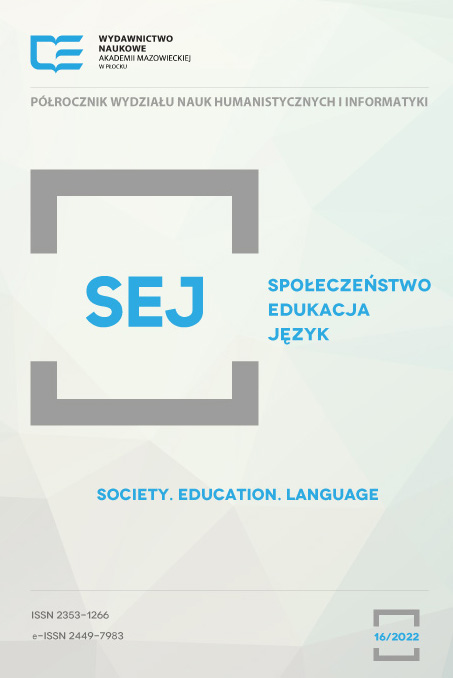LEADERSHIP-FOCUSED COACHING (LFC) AND SUPERVISION AS AN APPROACH OF EDUCATIONAL STAFF - ETHNOGRAPHICAL COMPARATIVE CASE STUDY
DOI:
https://doi.org/10.19251/sej/2022.16(13)Keywords:
coaching, facilitation, partnership, supervisionAbstract
This study describes the LFC Leadership-Focused Coaching approach and supervision as a method of evaluation among educational staff. The aim of the analysis is to draw attention to the concept of reflexivity, to refer to the idea of partnership and to support teaching and management staff equally in their professional life. This ethnographic research was supported by experience on the example of a comperative case study in three different educational situations. Identified similarities and differences helped to identify opportunities and new assumptions for reflective work on the basis of research observations and theoretical analysis of concepts. Conclusions of the research drew attention to the role of group support, the importance of mentoring and showed the need for personal and emotional development. Both forms of evaluation were found to have many similarities, whereby the research helped to establish that they integrate the acquired knowledge through a reflective function. Subsequent approaches closed the research area in the conclusion that educational leadership also requires facilitation, while group collaboration provides an additional evaluation tool. This study contributes to highlighting the importance of reflective supervision and LFC in the formation of modern education in the context of concern for respect, support and mentoring facilitation.
References
Afdal, Geir Sigmund. 2012. Supervision as moral activity. Moral Theories as Mediating Artifacts in the Practice of Supervision. Virtues In Formation and Supervision, vol. 32, 238-255.
Bachkirova, Tatiana et al. 2020. Supervision i coaching: Systematic literature review. International Coaching Psychology Review, vol. 15 (2).
Beach, Dennis et al. 2018. The Wiley Handbook of Ethnography of Education, USA: John Wiley & Sons, Inc., 162-165.
Boer, Harry Reinier et al. (2010). Supervision in ‘modern’ university governance: boards under scrutiny. Studies in Higher Education, 35(3), 317-333. https://doi.org/10.1080/03075070903062849.
Cell, Edward. (1984). Learning to learn from experience. Albany: State University of New York Press, 6.
Czakon, Wojciech. (2016). Podstawy metodologii badań w naukach o zarządzaniu. Piaseczno: Nieoczywiste GAB Media, 434-442.
Fischer, Frank and Carmel Sirianni (Eds.). 1984. Critical Studies in Organization and Bureaucracy. Philadelphia PA: Temple University Press, 254, 323. https://doi.org/10.1177/017084068600700313.
Fook, Jan and Fiona Gardner. 2007. Practicing Critical Reflection: A Resource Handbook. Open University Press, Maidenhead.
Fook, Jan and Fiona Gardner (Eds.). 2012. Critical Reflection in Context: Applications in Health and Social Care (1st ed.). Routledge. https://doi.org/10.4324/9780203094662.
Gray, Julie Anne. 2018. Leadership Coaching and Mentoring: A Research-Based Model for School Partnerships. International Journal of Education Policy and Leadership, 13(12), 1-21. https://doi.org/10.22230/ijepl.2018v13n12a844.
Hawkins, Peter and Robin Shohet. 2012. Supervision in the Helping Professions (4th ed),Maidenhead: McGraw-Hill, 8.
Hickson. Helen. 2011. Critical reflection: reflecting on learning to be reflective, Reflective Practice: International and Multidisciplinary Perspectives, 12 (6), 829-839. http://dx.doi.org/10.1080/14623943.2011.616687.
Jackson, Peter. 2008. Coaching, mentoring and organizational consultancy: Supervision and development. Coaching: An International Journal of Theory, Research and Practice, 1(1), 102-105.
Kilminster, Sue and Brian Jolly. 2000. Effective supervision in clinical practice settings: a literature review." Medical education, 34(10), 827-840.
Kostera, Monika. 2003. Metody badawcze w zarządzaniu humanistycznym. Warszawa: PWN, 15- 25.
Lucas, Michelle and Carol Whitaker. 2014. A model of co-facilitation for supporting group coaching-supervision, International Journal of Evidence Based Coaching and Mentoring, 12(2).
McMahon, Aisling. 2014. Four guiding principles for the supervisory relationship. Four guiding principles for the supervisory relationship, Reflective Practice: International and Multidisciplinary Perspectives, 2-16, 8. doi: 10.1080/14623943.2014.900010. Retrieved from: https://www.researchgate.net/publication/262583853_Four_guiding_principles_for_the_supervisory_relationship. Accessed March, 2014.
Mezirow, Jack and Associates. 1990. How critical reflection triggers transformative learning. Fostering critical reflection in adulthood: A guide to transformative and emancipatory learning. San Francisco: Jossey-Bass, 1-12.
Miles, Matthew and Michael Huberman. 2000. Analysis of qualitative data. Białystok: Trans Humana.
Proctor Brigid. 1987. Supervison. A co-operative exercise in accountability. In Marken M & Payne M. (Eds.), Enabling and ensuring supervision in practice. Leicester: National Youth Bureau and Council for Education and Training inYouth and Community Work.
Proctor, Brigid. 2000. Group supervision: A guide to creative practice. Sage, 31-32.
Richardson, Virginia. 2001. Teaching: Trends in research. In: Neil Smelser and Paul Baltes (Eds.), International Encyclopedia of the Social & Behavioral Sciences, 15483–15487. Oxford, England: Elsevier Science . https://www.researchgate.net/publication/334002232_Teaching_Trends_in_Research_on_Teaching
Robinson, Virginia. 1949. The dynamics of supervision under functional controls: a professional process in social casework. Philadelphia: University of Pennsylvania Press. https://doi.org/10.9783/9781512805703.
Walter, Carolyne and Thomas M. Young. 1999. Combining Individual and Group Supervision in Educating for the Social Work Profession. The Clinical Supervisor, 18(2), 73-89. https://doi.org/10.1300/J001v18n02_06.
Wilkins, David. 2017. Does reflective supervision have a future in English local authority child and family social work? Journal of children services 12 (2-3), Emerald, 1-23, 12. http://10.1108/JCS-06-2017-0024.
Thompson, Alison. 2013. How Schwartz rounds can be used to combat compassion fatigue? Nursing Management, vol 20 (4). doi: 10.7748/nm2013.07.20.4.16.e1102. Retrieved from: https://pubmed.ncbi.nlm.nih.gov/23923178/. Accessed July, 2013.
Yang, Weipeng et al.2021. Training teacher-researchers through online collective academic supervision: Evidence from a postgraduate teacher education programme. Journal of Computer Assisted Learning, 37(4), 1181–1193. https://doi.org/10.1111/jcal.12558.
